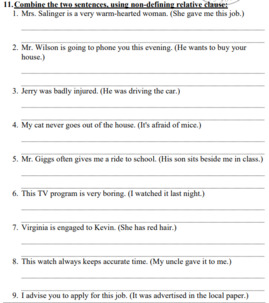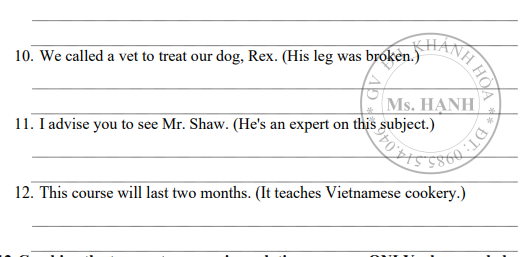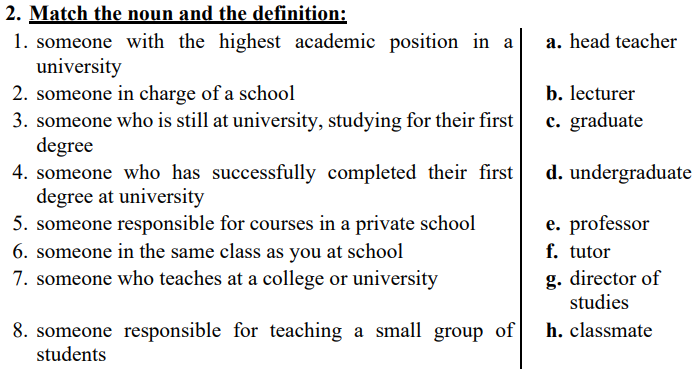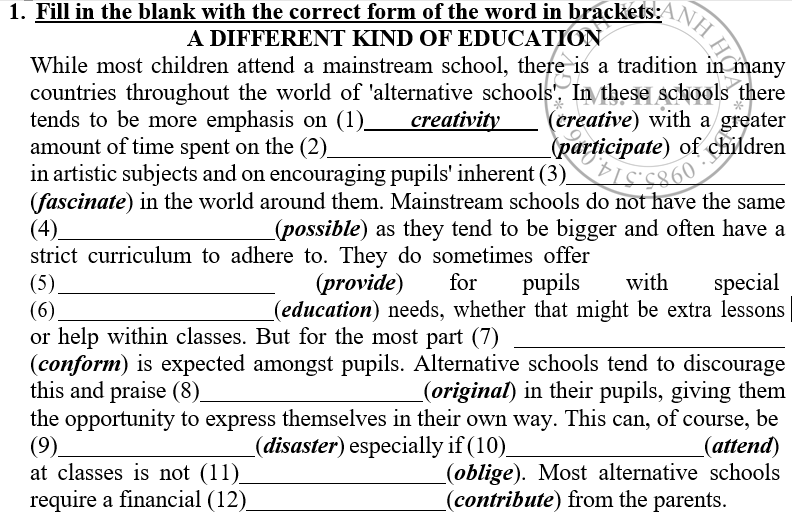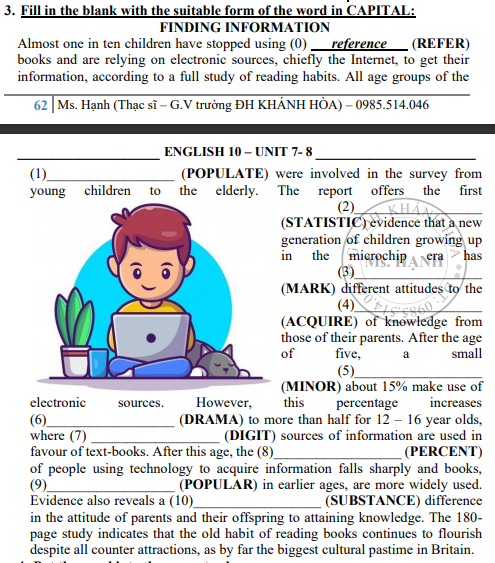
Unit 8: New Ways To Learn
1. population
2. statistical
3. remarkably
4. acquirement
5. minority
6. dramatically
7. digital
8. percentage
9. unpopular
10. substantial
Đúng 0
Bình luận (0)
1. Mrs. Salinger, who gave me this job, is a very warm-hearted woman.
2. Mr. Wilson, who wants to buy your house, is going to phone you this evening.
3. Jerry, who was driving the car, was badly injured.
4. My cat, which is afraid of mice, never goes out of the house.
5. Mr. Giggs, whose son sits beside me in class, often gives me a ride to school.
6. This TV program, which I watched last night, is very boring,
7. Virginia, who has red hair, is engaged to Kevin.
8. This watch, which my uncle gave to me, always keeps accurate time.
9. I advise you to apply for this job, which was advertised in the local paper.
10. We called a vet to treat our dog, Rex, whose leg was broken.
11. I advise you to see Mr. Shaw, who is an expert on this subject.
12. This course, which teaches Vietnamese cookery, will last two months.
Đúng 1
Bình luận (0)
Talk about advantages and disavantages of using electronic devices in learning.
Currently, electronic devices are very popular with every student. Using computer help us learn lessons effectively with explanation, sounds and pictures. They help students communicate with each other or relax by listening to music and playing games when they are bored and tired of studying. Students study better by using helpful learning apps on smartphones, laptops, tablets and other media players (dictionary, spelling, translation, pronunciation and other apps). Electronic devices can be used for research and study, and for storing information and textbooks. This can save time and make students' backpacks lighter. But in addition to the benefits that electronic devices bring, they also have disadvantages such as: The computer makes our eyes tired. Electronic devices distract students from their studies: students may play games, text, chat and cheat (type the questions and search for answers on the Internet). Students have access to inappropriate information, videos and pictures, spend many hours reading and watching, and forget about their projects or assignments. Students might take embarrassing pictures of others, share them on the Internet or use them to demand money or force people to do things for them.
Bài dịch
Hiện nay, các thiết bị điện tử rất phổ biến với mọi học sinh. Sử dụng máy tính giúp chúng ta học bài học hiệu quả với lời giải thích, âm thanh và hình ảnh. Họ giúp học sinh giao tiếp với nhau hoặc thư giãn bằng cách nghe nhạc và chơi game khi họ chán và mệt mỏi với việc học. Học sinh học tốt hơn bằng cách sử dụng các ứng dụng học tập hữu ích trên điện thoại thông minh, máy tính xách tay, máy tính bảng và các trình phát phương tiện khác (từ điển, chính tả, dịch, phát âm và các ứng dụng khác). Các thiết bị điện tử có thể được sử dụng để nghiên cứu và nghiên cứu, và để lưu trữ thông tin và sách giáo khoa. Điều này có thể tiết kiệm thời gian và làm cho ba lô của học sinh nhẹ hơn. Nhưng ngoài những lợi ích mà thiết bị điện tử mang lại thì chúng còn có những bất lợi như: Máy tính làm cho mắt chúng ta mệt mỏi. Các thiết bị điện tử khiến học sinh mất tập trung vào việc học: học sinh có thể chơi trò chơi, nhắn tin, trò chuyện và gian lận (nhập câu hỏi và tìm kiếm câu trả lời trên Internet). Học sinh có quyền truy cập vào thông tin, video và hình ảnh không phù hợp, dành nhiều giờ để đọc và xem và quên đi các dự án hoặc bài tập của mình. Học sinh có thể chụp ảnh xấu hổ về người khác, chia sẻ chúng trên Internet hoặc sử dụng chúng để đòi tiền hoặc buộc mọi người làm việc cho họ.
#Tham khảo nha!~
Đúng 2
Bình luận (0)
viết một đoạn văn ngắn về new ways to learn
I. Combine these sentences by using relative pronoun WHO.
1. I met a woman. She can speak six languages.
→ ________________________________________________________________________
2. The postman was late this morning. He is nearly always on time.
→ ________________________________________________________________________
3. I have a friend. He is very good at repairing cars.
→ __________________________________________________________________...
Đọc tiếp
I. Combine these sentences by using relative pronoun WHO.
1. I met a woman. She can speak six languages.
→ ________________________________________________________________________
2. The postman was late this morning. He is nearly always on time.
→ ________________________________________________________________________
3. I have a friend. He is very good at repairing cars.
→ ________________________________________________________________________
4. She’s the singer. She has just signed a contract with a recording company.
→ ________________________________________________________________________
5. The woman was very nice. She sat next to me on the plane.
→ ________________________________________________________________________
6. Do you know the boy? He borrowed that book.
→ ________________________________________________________________________
7. Mary is the girl. She was wearing the most fashionable dress.
→ ________________________________________________________________________
8. The manager is very young. He was introduced to the president.
→ ________________________________________________________________________
9. My father is a doctor. He is fifty years.
→ ________________________________________________________________________
10. Alexander Fleming received the Nobel Prize in 1945. He discovered penicillin.
→ ________________________________________________________________________
11. The policeman wasn’t very friendly. He stopped our car.
→ ________________________________________________________________________
. Mark the letter A, B, C or D to indicate the underlined part that needs correction in each of the following questions.
81. Before I came to England, I hadnt had the opportunity to speak to people their native tongue is English.
A B C D
82. No one has said anything would persuade me to change my mind.
A B C...
Đọc tiếp
. Mark the letter A, B, C or D to indicate the underlined part that needs correction in each of the following questions.
81. Before I came to England, I hadn't had the opportunity to speak to people their native tongue is English.
A B C D
82. No one has said anything would persuade me to change my mind.
A B C D
83. The woman sitting on the red chair is the person to who you must give this envelope.
A B C D
84. There are some teachers in our school try to improve the quality of teaching by making use of hi-tech
A B C D
devices.
85. Modern children, who lives have become more and more dependent on electronic devices, find the
A B C
traditional way of teaching very dull and boring.
D
86. Smartphones and tablets which can be used as effective learning tools for children.
A B C D
87. What is the name of the girl that her mobile phone was stolen?
A B C D
88. A tablet is a mobile computer is also useful for language learning.
A B C D
89. Those want to improve their English can download free digital lessons from the Internet to study.
A B C D
90. Mr Peterson who has worked for the same school all his life, is retiring next month.
A B C D
. Mark the letter A, B, C or D to indicate the underlined part that needs correction in each of the following questions.
81. Before I came to England, I hadnt had the opportunity to speak to people their native tongue is English.
A B C D
82. No one has said anything would persuade me to change my mind.
A B C...
Đọc tiếp
. Mark the letter A, B, C or D to indicate the underlined part that needs correction in each of the following questions.
81. Before I came to England, I hadn't had the opportunity to speak to people their native tongue is English.
A B C D
82. No one has said anything would persuade me to change my mind.
A B C D
83. The woman sitting on the red chair is the person to who you must give this envelope.
A B C D
84. There are some teachers in our school try to improve the quality of teaching by making use of hi-tech
A B C D
devices.
85. Modern children, who lives have become more and more dependent on electronic devices, find the
A B C
traditional way of teaching very dull and boring.
D
86. Smartphones and tablets which can be used as effective learning tools for children.
A B C D
87. What is the name of the girl that her mobile phone was stolen?
A B C D
88. A tablet is a mobile computer is also useful for language learning.
A B C D
89. Those want to improve their English can download free digital lessons from the Internet to study.
A B C D
90. Mr Peterson who has worked for the same school all his life, is retiring next month.
A B C D
I. Combine these sentences by using relative pronoun WHO.
1. I met a woman. She can speak six languages.
→ ________________________________________________________________________
2. The postman was late this morning. He is nearly always on time.
→ ________________________________________________________________________
3. I have a friend. He is very good at repairing cars.
→ __________________________________________________________________...
Đọc tiếp
I. Combine these sentences by using relative pronoun WHO.
1. I met a woman. She can speak six languages.
→ ________________________________________________________________________
2. The postman was late this morning. He is nearly always on time.
→ ________________________________________________________________________
3. I have a friend. He is very good at repairing cars.
→ ________________________________________________________________________
4. She’s the singer. She has just signed a contract with a recording company.
→ ________________________________________________________________________
5. The woman was very nice. She sat next to me on the plane.
→ ________________________________________________________________________
6. Do you know the boy? He borrowed that book.
→ ________________________________________________________________________
7. Mary is the girl. She was wearing the most fashionable dress.
→ ________________________________________________________________________
8. The manager is very young. He was introduced to the president.
→ ________________________________________________________________________
9. My father is a doctor. He is fifty years.
→ ________________________________________________________________________
10. Alexander Fleming received the Nobel Prize in 1945. He discovered penicillin.
→ ________________________________________________________________________
11. The policeman wasn’t very friendly. He stopped our car.
→ ________________________________________________________________________
II. Combine these sentences by using relative pronoun WHOM.
1. Most of the people couldn’t come. I invited them to the party.
→ ________________________________________________________________________
2. Peter wasn’t at the party. I had seen him before.
→ ________________________________________________________________________
3. They are good friends. You can play with them.
→ ________________________________________________________________________
4. Two people walked into the classroom. I didn’t know them.
→ ________________________________________________________________________
5. The teacher no longer teaches in our school. We studied with her last year.
→ ________________________________________________________________________
6. I don’t know the name of the woman. I met her yesterday.
→ ________________________________________________________________________
7. The officer wasn’t very friendly. I spoke to him yesterday.
→ ________________________________________________________________________
8. These are the workers. You met them at the meeting last year.
→
9. My parents sent their best wishes. You met them last month.
→ ________________________________________________________________________
10. Mary and Magaret are twins. You met them yesterday.
→ ________________________________________________________________________
III. Combine these sentences by using relative pronoun WHICH.
1. The light was fully booked. We wanted to travel on it.
→ ________________________________________________________________________
2. Clothes are too small for her. Why does she always wear them?
→ ________________________________________________________________________
3. You went to a party. Did you enjoyed it?
→ ________________________________________________________________________
4. The chair wasn’t very comfortable. We were sitting on it.
→ ________________________________________________________________________
5. The stories are usually very funny. Tom tells them.
→ ________________________________________________________________________
6. The fish was really delicious. We had it for dinner.
→ ________________________________________________________________________
7. Have you seen the photograph? Ann took them.
→ ________________________________________________________________________
8. She always asks me the questions. The questions are very difficult to answer.
→ ________________________________________________________________________
9. Bien Hoa is nice. It is my hometown.
→ ________________________________________________________________________
10. Bangkok has many beautiful temples. It is the capital of Thailand.
→ ________________________________________________________________________
IV. Combine these sentences by using relative pronoun WHOSE.
1. The lady is a teacher at our school. Her son went on a picnic with us last weekend.
→ ________________________________________________________________________
2. John received a scholarship. His grades are the highest in the school.
→ ________________________________________________________________________
3. Hoan Kiem Lake is a historical place. Its water is always blue.
→ ________________________________________________________________________
4. This is Mrs. Jones. Her son won the scholarship last year.
→ ________________________________________________________________________
5. We are visiting the children. Their parents died in the storm.
→ ________________________________________________________________________
6. Tuan has just won the second prize in the English contest. Tuan’s uncle is a pilot.
→ ________________________________________________________________________
7. We are discussing about a famous writer. You are reading her book.
→ ________________________________________________________________________
8. That man is an artist. I don’t remember the man’s name.
→ ________________________________________________________________________
9. This school is only for children. Their first language is not English.
→ ________________________________________________________________________
10. What was the name of the man? His car had broken down.
→ ________________________________________________________________________
V. Combine these sentences by using relative pronoun THAT.
1. She is the only person. She undrestands me.
→ ________________________________________________________________________
2. This is the worst film. I have ever seen it.
→ ________________________________________________________________________
3. A bus goes to the airport. It runs every half an hour.
→ ________________________________________________________________________
4. He talked about the books and the authors. They interested him.
→ ________________________________________________________________________
5. The chemistry book was a little expensive. I bought it.
→ ________________________________________________________________________
VI. Choose the best answer:
I. Combine these sentences by using relative pronoun WHO.
1. I met a woman. She can speak six languages.
→ I met a woman who can speak six languages.
2. The postman was late this morning. He is nearly always on time.
→ The postman who is nearly always on time was late this morning.
3. I have a friend. He is very good at repairing cars.
→ I have a friend who is very good at reparing cars.
4. She’s the singer. She has just signed a contract with a recording company.
→ She is the singer who has just signed a contract with a recording company.
5. The woman was very nice. She sat next to me on the plane.
→ The woman who sat next to me on the plane was very nice.
6. Do you know the boy? He borrowed that book.
→ Do you know the boy who borrowed that book?
7. Mary is the girl. She was wearing the most fashionable dress.
→ Mary is the girl who was wearing the most fashionable dress..
8. The manager is very young. He was introduced to the president.
→ The manage who was introduced to the president is very young.
9. My father is a doctor. He is fifty years.
→ My father who is fifty years old is a doctor.
10. Alexander Fleming received the Nobel Prize in 1945. He discovered penicillin.
→ Alexander Fleming who discover penicillin received theNobel Prize in 1945.
11. The policeman wasn’t very friendly. He stopped our car.
→ The policeman who stopped our car wasn't very friendly.
II. Combine these sentences by using relative pronoun WHOM.
1. Most of the people couldn’t come. I invited them to the party.
→ Most of the people whom I invited to the party couldn't come.
2. Peter wasn’t at the party. I had seen him before.
→ Peter, whom I had seen before, wasn't at the party.
3. They are good friends. You can play with them.
→ They are good friends whom you can play with.
4. Two people walked into the classroom. I didn’t know them.
→ Two people, whom I didn't know, walked into the classroom.
5. The teacher no longer teaches in our school. We studied with her last year.
→ The teacher, whom we studied with last year, no longer teaches in our school.
6. I don’t know the name of the woman. I met her yesterday.
→ I don't know the name of the woman whom I met yesterday.
7. The officer wasn’t very friendly. I spoke to him yesterday.
→ The officer whom I spoke to yesterday wasn't very friendly.
8. These are the workers. You met them at the meeting last year.
→ These are the workers whom you met at the meeting last year.
9. My parents sent their best wishes. You met them last month.
→ My parents whom you met last month sent their best wishes.
10. Mary and Magaret are twins. You met them yesterday.
→ Mary and Magaret, whom you met yesterday, are twins.
III. Combine these sentences by using relative pronoun WHICH.
1. The light was fully booked. We wanted to travel on it.
→ The light which we wanted to travelled on was fully booked.
2. Clothes are too small for her. Why does she always wear them?
→ Why does she always wear clothes which are too small for her?
3. You went to a party. Did you enjoyed it?
→ Did you enjoy the party which you went to?
4. The chair wasn’t very comfortable. We were sitting on it.
→ The chair which we were sitting on wasn't very comfortable.
5. The stories are usually very funny. Tom tells them.
→ The stories which Tom tells are usually very funny.
6. The fish was really delicious. We had it for dinner.
→ The fish which we had for dinner was really delicious.
7. Have you seen the photograph? Ann took them.
→ Have you seen the photograph which Ann took?
8. She always asks me the questions. The questions are very difficult to answer.
→ She always asks me the questions which are very difficult to answer.
9. Bien Hoa is nice. It is my hometown.
→ Bien Hoa, which is my hometown, is nice.
10. Bangkok has many beautiful temples. It is the capital of Thailand.
→ Bangkok, which is the capital of Thailand, has many beautiful temples.
IV. Combine these sentences by using relative pronoun WHOSE.
1. The lady is a teacher at our school. Her son went on a picnic with us last weekend.
→ The lady whose son went on a picnic with us last week is a teacher at our school.
2. John received a scholarship. His grades are the highest in the school.
→ John, whose grades are the highest in the school, received a scholarship.
3. Hoan Kiem Lake is a historical place. Its water is always blue.
→ Hoan Kiem Lake, whose water is always blue, is a historical place.
4. This is Mrs. Jones. Her son won the scholarship last year.
→ This is Mrs. Jones whose son won the scholarship last year.
5. We are visiting the children. Their parents died in the storm.
→ We are visiting the children whose parents died in the storm.
6. Tuan has just won the second prize in the English contest. Tuan’s uncle is a pilot.
→ Tuan whose uncle is a pilot has just won the second prize in the English contest.
7. We are discussing about a famous writer. You are reading her book.
→ We are discussing about a famous writer whose book you are reading.
8. That man is an artist. I don’t remember the man’s name.
→ That man whose name I don't remember is an artist.
9. This school is only for children. Their first language is not English.
→ This school is only for children whose first language is not English.
10. What was the name of the man? His car had broken down.
→ What was the name of the man whose car had broken down?
V. Combine these sentences by using relative pronoun THAT.
1. She is the only person. She undrestands me.
→ She is the only person that understands me.
2. This is the worst film. I have ever seen it.
→ This is the worst film that I have ever seen.
3. A bus goes to the airport. It runs every half an hour.
→ The bus that goes to the airport runs every half an hour.
4. He talked about the books and the authors. They interested him.
→ He talked about the books and the authors that interested him.
5. The chemistry book was a little expensive. I bought it.
→ The chemistry book that I bought was a little expensive.
Đúng 0
Bình luận (0)
2. participation
3. fascination
4. possibilities
5. provisions
6. educational
7. conformance
8. originality
9. disastrous
10. attendance
11. obliged
12. contribution
Đúng 0
Bình luận (0)




